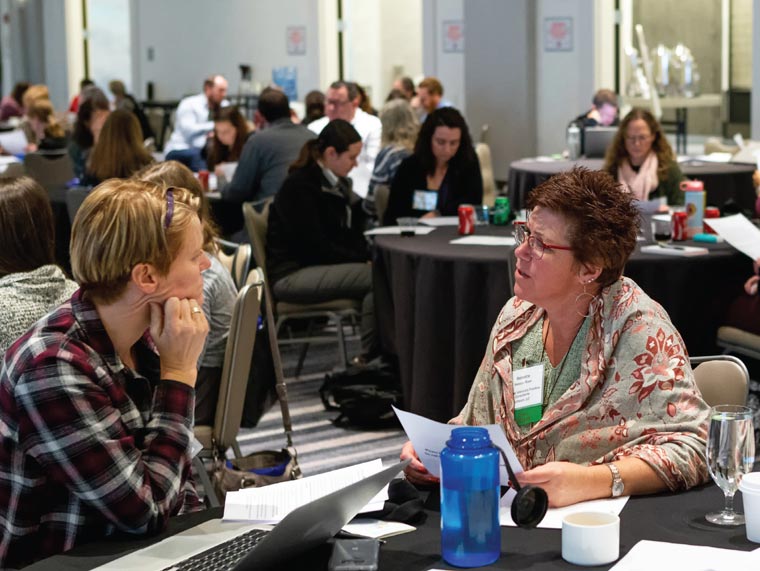
January 15, 2020
Talk is tricky
Garnetta Santiago, a licensed veterinary technician, stresses that the way people communicate has a direct impact on well-being.
In particular, she suggests that microaggressions—brief, subtle statements, miscommunications, actions, or incidents that are hostile or derogatory—create stress that inhibits well-being for veterinary professionals and may contribute to feelings of isolation.
“When we talk about diversity, we don’t consider the impact of the diverse environment around us and how that affects our communication trends,” Santiago said. “The country is a rich tapestry of cultures, languages, traditions, and backgrounds. There is a huge disconnect, and there is a huge problem, when we are a profession that serves an entire country, and we are not representative of the people and populations that we serve.”
Santiago, manager of academic and professional affairs for Zoetis Inc., spoke about communication and microaggressions during the session “Did She Really Just Say That? The Impact of Unconscious Communication Patterns on Wellbeing in the Veterinary Profession” at the 2019 Veterinary Wellbeing Summit, Nov. 17-19 in Rosemont, Illinois.

When words can hurt
“Culture shapes a lot of the lenses that we operate through,” Santiago said. “We know what we know, but what happens when you encounter people that are different? … Our cultural lenses help us navigate the world, but they are also a source of some blind spots, and a lot of the mismatches or miscues in communication come out of our blind spots.”
For example, a person may be trying to communicate and connect with someone, but because of his blind spots, he may inadvertently be harming that individual, Santiago said.
Elements of culture include nationality, ethnicity, religion, sexual orientation, and language.
Lisa Greenhill, EdD, senior director for institutional research and diversity at the Association of American Veterinary Medical Colleges, discussed microaggression in an AAVMC DiVersity Matters podcast in 2017 with Kathleen Wong, PhD, chief diversity officer at San Jose State University.
It is important to inform and educate people about microaggressions because they are difficult to deal with, and they’re not necessarily seen as very severe from outside observers or perpetrators, Dr. Wong said.
“They are so micro,” she said. “But we know from research that microaggressions take a huge psychological toll and contribute a lot to organizational culture and perceptions of safety, welcomeness, or warmness. … We generally don’t talk to people about them, and so you have this other whammy, where people have no idea that they have done something wrong.”
Dr. Wong said that some examples of microaggressions for someone in veterinary medicine might be: So do you guys get to do any real doctoring? Did you really study medicine? Are you a real doctor?
Be polite
“Not all insults are the same,” Santiago said. “A microaggression is an equal opportunity offender. They’re not limited to race.” There are microaggressions related to religion and sexual orientation, among others.
Santiago broke microaggressions into the following three categories:
- Microassaults: An insult that is overt, conscious, and with a goal to hurt someone’s feelings and to further marginalize or isolate an individual. For example: “It’s a shame you decided to have kids in veterinary school; you could have gone far.”
- Microinsults: A “bless your heart” insult or a statement that is not intentionally mean or demoralizing. For example: “Wow, you speak good English” or “You graduated from that veterinary school? There’s probably a lot I’m going to have to teach you here in the practice.”
- Microinvalidations: An insult that negates or nullifies the thoughts or experiences of a certain group of people. For example: “Why is everything about race with you?”
“I have experienced my share of microaggressions, and a lot of times I experience them in the rearview mirror,” Santiago said. “So, someone will say something. Something doesn’t feel right about it, but I’ll process it later. When you think about it, every time an individual experiences something like this and they have to go back and look at it, it builds what I call a callus because you are not able to process or address it in real time.”
Dr. Stacie Gallenstein, an anatomy professor at North Carolina State University College of Veterinary Medicine who is white, knows she has implicit bias.
“I made an unfortunate comment that President Obama was an amazing speaker,” Dr. Gallenstein said at the summit. “What I meant was that he is one of the best speakers I have ever seen, period. But what I learned was that a lot of my African-American students read that as, ‘He’s one of the best speakers; he speaks so well as a black person.’ My intent was completely different than what they had interpreted.”
Dr. Gallenstein said she is on the committee for diversity and inclusion at the veterinary college, and she is working to be a good ally, but it’s a learning process.
Santiago argues that you can’t control an individual’s response, but you can be vulnerable and open to feedback.
“My personal belief is that as long as you don’t stop trying, as long as you open yourself to be vulnerable—and that goes for the dominant culture as well as members of underrepresented groups—as long as your goal is constantly moving towards better understanding through communication, and you don’t shut yourself off and retreat into your tribe, then you’ll get closer than where you were before,” to being more aware of microaggressions.
Veterinary professionals interested in learning more about their own bias and possible blind spots can take a self-assessment.
Listen to the DiVersity Matters podcast about microaggressions.
Related JAVMA content:
Defining well-being
Prioritizing well-being at the institutional level
Access to lethal means looked at to lower veterinary suicide rate
Toolkit to help veterinary colleges deal with suicide
AAVMC keeps focused on inclusion
Certificate programs promote diversity in veterinary medicine
Cultural competency program created for students